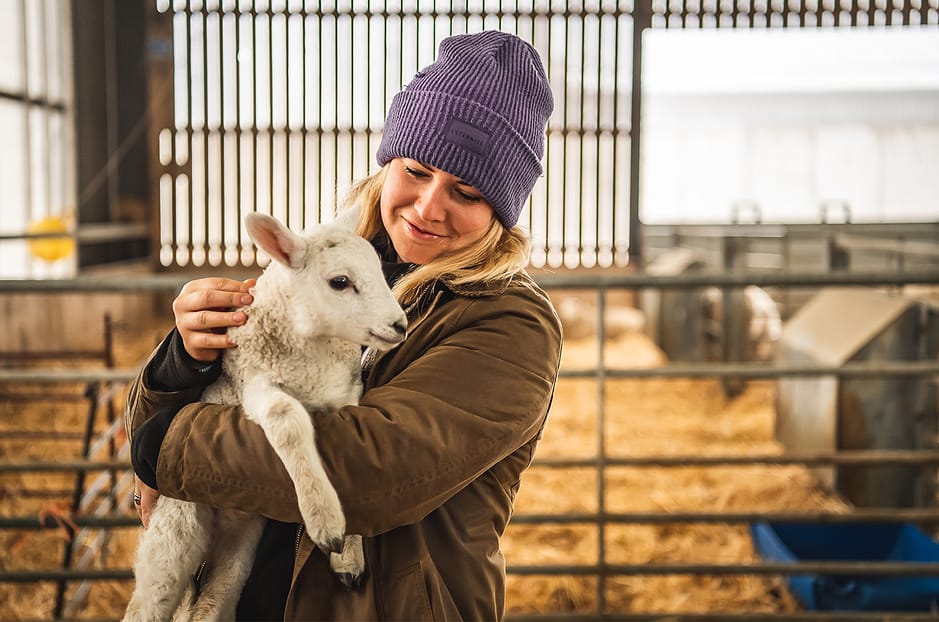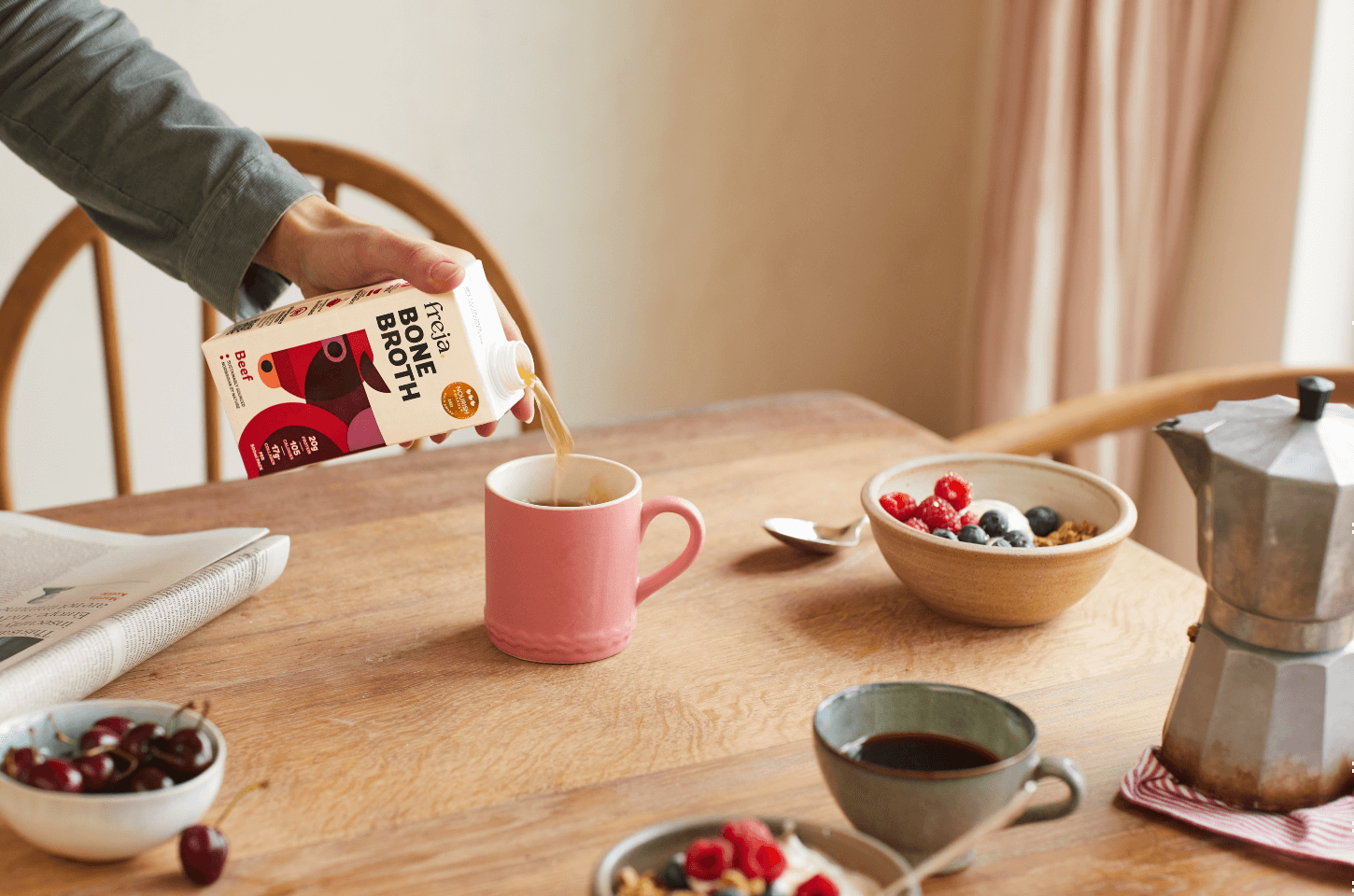Q and A with Jemima Marks: Marketing and Sales Manager, Coombe Farm Organic

Can you tell us a short history of how Coombe Farm Organic came about?
Coombe Farm Organic was set up as a form of farm diversification seven years ago. With sustainability at its heart, our team took what was a by-product of the successful organic dairy farm – male calves – and by careful breeding, created award-winning beef to sell direct to customers as meat boxes. From a small office and a couple of chest freezers, the business grew organically (excuse the pun!) to meet the increasing demand from customers who loved the idea of buying directly from the farm.
Fast forward to 2022 and we rear award-winning beef, lamb, rose veal, chicken, pork and geese from our organic farm in Somerset, using nature friendly farming methods that boost biodiversity and replenish the soil. We have over 500 products available to purchase, including hard to find organic products such as offal, tallow, stock bones and unusual steaks and joints.
We also work with trusted organic and sustainable partners to offer a wide selection of ethical meat and fish options – from organic salmon, turkey and duck, parkland venison and bone broth to sustainably sourced wild game and Cornish day-boat caught fish.
We are particularly known for our range of meat boxes, for which we won an award at the 2021 BOOM Awards for ‘Best Organic Box Scheme’. The boxes are a carefully curated selection of our best produce, changing with the seasons and offering customers a built-in discount.
Highlights include the Organic Balancing Box, a selection of underrated, unusual cuts that help customers to carcass balance and minimise food waste.
What do you feel is the best thing about Coombe Farm Organic?
The best thing about Coombe Farm Organic is that we offer a brilliant service, from a simple to use website to speedy next day delivery, combined with traditional, slow-grown produce that is the result of really sound environmental practices. This is an amazing blend of what a modern consumer demands from a shopping experience vs an old fashioned way of doing things on the farm.
Customers just love that they are buying directly from the producer, that all the food is traceable and not a product of long, unethical supply chains. From farming to the on-farm butchery and warehouse, our short supply chain guarantees traceability at every stage of the production process. Our animals travel just 7 miles to the local abattoir to minimise any stress during the end-of-life process and CFO are proud to support this small, family business, of which so few remain in the UK.
What are you most proud of?
Earlier this year we were proud to launch a range of Organic Rose Veal. We wanted to offer organic rose veal as an ethical option for customers to address the issues surrounding surplus bull calves from a dairy herd.
If we agree dairy is a vital industry for British farming, we need to face up to the issue of surplus male calves. With little control of what happens to calves once they are sold at market, and live transportation over 14 days old to the continent still legal in the UK, our farming team wanted to find a sustainable solution that aligns with our ethical approach to rearing organic livestock.
By adding organic rose veal to our diet, we are supporting a viable alternative to the natural consequence of producing dairy, helping to close the loop and keep animals in the herd.
Rose veal is a fantastic product, and can be eaten with a clear conscience when sourced from reputable farms. Instead of the typical six months for indoor-reared veal in the UK, our veal is grown slowly to ten months old, with plenty of grass, forage, and fibre in the diet as well as organic whole milk.
The response has been hugely positive. As well as congratulating CFO on highlighting the ethical issues – “well done for being part of the solution” – customers are so happy to be able to purchase organic rose veal.
What has been the most challenging aspect of 2022?
2022 has been a really challenging year for food producers. We are lucky in a sense in that we are mainly protected from rising costs of production by creating our own energy through solar and growing our own animal feed, but inflation is making its mark, particularly with products we need buy in from other suppliers.
We are also conscious of the impacts the cost of living crisis is having on our customers so we have made great efforts to keep our prices level or reduce them where we can, and to increase our monthly offers and discounts on meat boxes. It is crucial we get the balance right as we don’t want to devalue what we do – organic farming is not a cheap or quick process and we don’t want to start cutting corners.
Rearing livestock to the rigorous organic standards laid down by the Soil Association isn’t just a case of ticking a few boxes and filling in some forms. It shapes the basis for everything we do. We believe that providing a healthy, high welfare environment for animals to thrive in results in the delicious flavour of our products, and we are not prepared to make shortcuts to bring costs down at the expense of animal welfare.
Do you use social media a lot as a business? How helpful do you find it?
We certainly do – our content emphasises the importance of soil quality, biodiversity and eating less meat but better quality from grass-fed animals that have been raised ethically, using regenerative organic farming methods that are kind to the environment.
Our aim is to share clear, accurate information to help customers make informed decisions. There is a lot of greenwashing in the industry, which is why we are proud of our organic status. Customers can be reassured that the claims we make are licensed by a governing body who carry out an audit on a yearly basis.
We’re sharing more farming insights on our social too – this year our combined following on Facebook and Instagram has grown to over 20,000 and we are seeing great engagement with our recipe reels and showing more behind the scenes from the farm. We are also increasing our influencer activity with gifting programmes and recipe collaboration. We like to work with micro-influencers who have small and highly engaged followings to appeal to new customers.
Like with any digital platform, we are constantly learning!
What do you think is the most important thing for small businesses to focus on?
The most important thing to focus on is the provenance or story behind your business. Besides having fantastic products, customers want to know they are making the choices that will have a positive impact on the environment.
Farming using traditional, organic methods has never been more important in these times of climate emergency. Organic farms are more resilient against climate change and are helping to tackle the decline in biodiversity, specifically pollinators on whom we rely on for food production around the world.
Can you describe a day in the office at Coombe Farm Organic?
Our butchery and warehouse team are the first in, usually starting their day around 6.30am. By 8.30am our office team – general manager, marketing, accounts and customer service – are also raring to go to deliver our weekly sales targets and longer term goals. A real treat is to see our click and collect customers come in for their orders during the day so we get to have a natter and hear some face to face feedback. We also recently started using the service Too Good To Go, helping to tackle food waste by selling ‘mystery bags’ or product with 75% off the retail price to ensure any products nearing their use by date do not go to waste. This means we have around 100 people popping in daily which is great local exposure for us too!
The quality of our products is of utmost importance, so at least once a week our head butcher will cook products for us to sample. We have been developing a dry-aged steak range, so recently this tasting session has been extremely popular! Our marketing team will probably visit the animals on the farm at some point too to capture imagery and video for our channels.
What are your 2023 goals?
Our 2023 goals are to continue growing the business at a sustainable rate, working closely with the farming manager to ensure we have a selling route for all the livestock reared on the farm. We have some exciting new products on the horizon including ready-to-eat cooked meats and charcuterie too… so watch this space.
As ever we will continue banging the drum for organic food, coming up with new ways to communicate to our customers why it’s the best choice for people, farm animals, wildlife and the planet.
To find out more about Coombe Farm Organic, visit their website and order today.






